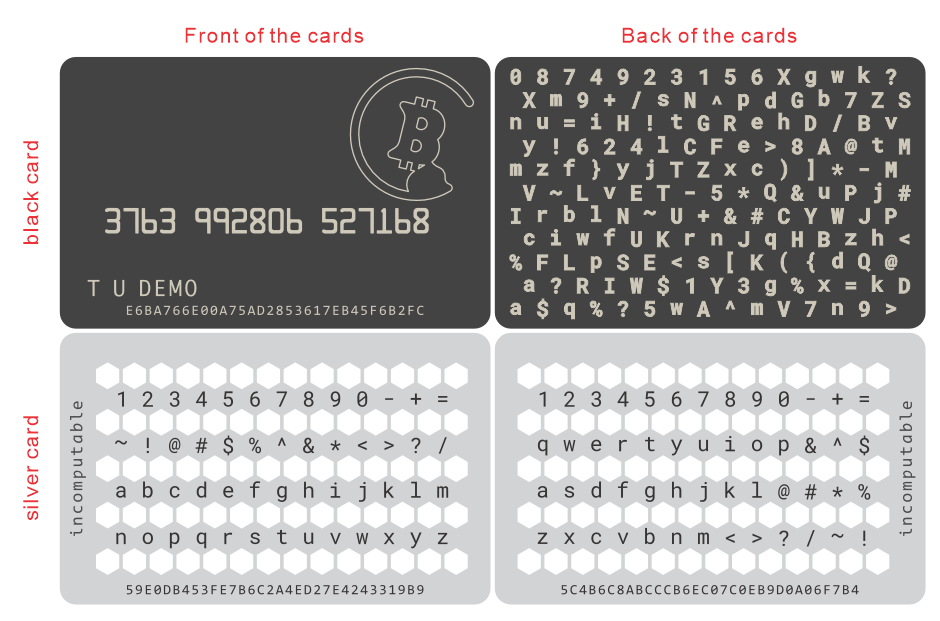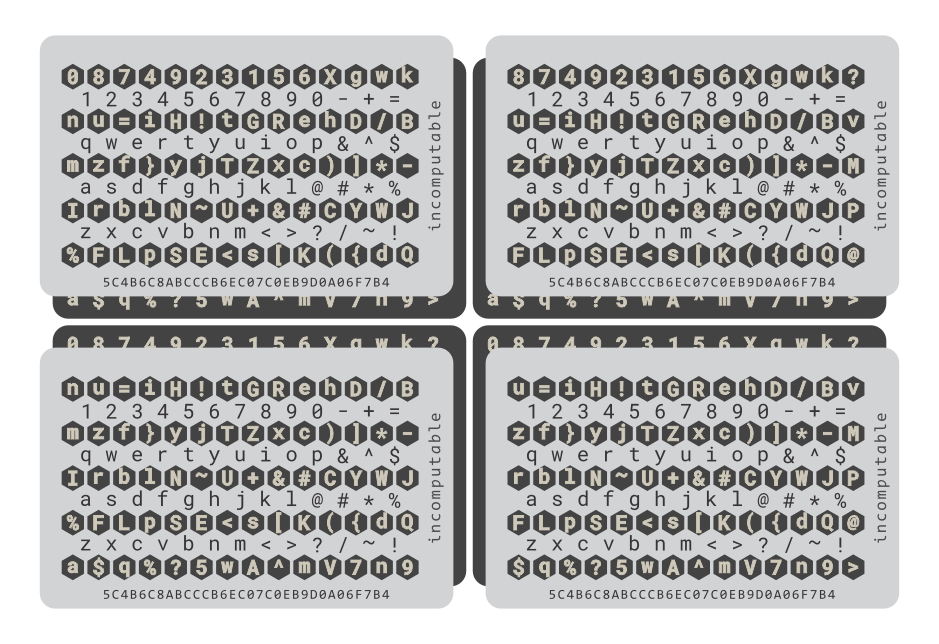Hey, guys.
Here's a challenge to win 10,000,000 sats, worth about $6,400 when posted here.
This is a reverse deduction puzzle, NOT a brute force one, nevertheless, any attempt at a brute force solution is welcome, and any analysis with the help of AI tools is also welcome.The puzzle is as follows
1. Here's the BIP39 seed phrase named
S1, and the 12 seed words are:
arena brisk seminar tool risk cat despair repeat seat property cattle later
2. Here's a set of two cards called
CipherCard used for encryption, the black card is a data card with a lot of substitution characters laser-engraved, and the silver card is covered with cut-out holes and index characters laser-engraved.
https://www.talkimg.com/images/2024/04/19/jhps8.png3. Now using the
CipherCard as the picture shows to perform substitution encryption on the seed phrase
S1, to get ciphertext
C1 as follows:
URU/Yw
LwE~T1
AE&8If
4YQ8Iw
C2Q~EE
nvH~TE
JEQLJY
rEQL5U
4wuQIw
CT&lQ&
&TT2&E
K>I5ef
You can claim the prize if you can derive the substitution
RULE for converting from plaintext to ciphertext based on plaintext
S1, ciphertext
C1, and the
CipherCard mentioned above.
Bitcoin transaction fees will be paid out of the prize, receiving the prize is completely tax-free in some countries, while in others you will be taxed when you exchange bitcoin for local fiat currency.Here's How
Let's assume you've tried to recover this wallet by entering
S1 plaintext into Electrum or whatever software/hardware wallet you prefer, if you're not sure about the derivation path, here's a hint:
p2pkh
m/44h/0h/0h
Now you can see that the entire balance in this wallet was spent to a 2-of-3 multisig wallet address:
3ARNTrr77hteEMpsR9czY9fjr3iUK4u9DJ
And this is our jackpot.
You already control the first Master Private Key of this multisig wallet because you know
S1, you can easily verify that the first Master Public Key is:
xpub6AHLobkTKhivG2iA35ky2XzXViUKKcufHQbvUEb1jkC1BPr7dGaJNqSj6jPj2QySUssXBtYDMdJezM5bxq17cH7PbRVX9fcxzgVjQ8rZwye
If you're not sure about the derivation path of this multisig wallet, here's another hint:
p2sh
m/45h/0
To create an observation wallet, the other two Master Public Keys you need are as follows:
xpub6ACDZ7jooxgrDb7Hdh14jYcyqL551UhLyKRvVEAcsEKVLjkdRTB9wWK3SQ6kHumHJo5Cj7NLYGo1gibDhPDba49mGAmYxYbtB7zgE3BMgk1
xpub6BK1kchT9yHsk6i7rsmehWeE44yqRhbyYKrBSQ1bxsPKqKdEneDykfRnqaqbB1rBjrfTgDRxnw6z3tTXecyq7gqkVBQXzfftz81mEM9nhYr
But to spend the balance of this 2-of-3 multisig wallet, you have to control at least one more private key, and the only information you can get about this second private key is the following ciphertext
C2:
URUd53
d(C%ECNFS
d[s[KS
qFC<{(
dFUlqq
%JbEsp
Q#$EpJwd
KFUNFA
[l<#m<
ee15ef
As mentioned, you have derived the substitution
RULE for converting from plaintext to ciphertext by using plaintext
S1, ciphertext
C1, and
CipherCard, it will not be difficult to invert plaintext
S2 from ciphertext
C2 and
CipherCard.
When you get
S1 and
S2, you'd better sweep up all your prize at the first opportunity in case some other smart guy gets there first. After that, please take some time to detail your analysis process so I can improve the rules, thanks in advance.
The puzzle won't be too easy, requiring basic math knowledge about bitcoin and blockchain, a bit of patience, and a bit of luck. Yet it won't be too hard either, as you can see from the short ciphertext (compared to the plaintext), that I haven't used too many tricks to interfere with your analysis.
If you do put in a little effort but can't solve the puzzle, you can forward it to the guy you think is the smartest among the people you know and then share the prize with them.
Of course sponsoring this challenge is also appreciated, and I'm really thinking about how to give the challengers and sponsors a little surprise, any offers?
Additional useful information
Considering that not having a physical card in your hand will inconvenience you in recognizing and reading the substitution table, I list all the possible combinations regarding the stacked placement of the two cards below.
https://www.talkimg.com/images/2024/04/19/jhWXw.pnghttps://www.talkimg.com/images/2024/04/19/jhD93.pnghttps://www.talkimg.com/images/2024/04/19/jhet9.pngHave fun solving the puzzle, and, well, good luck!















